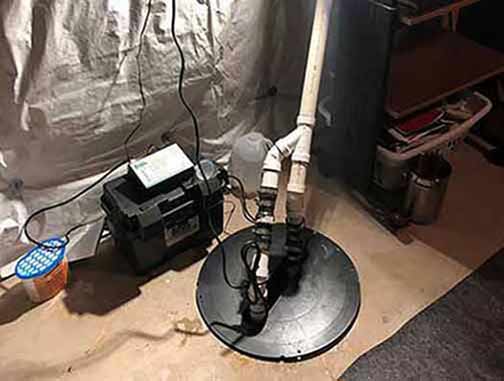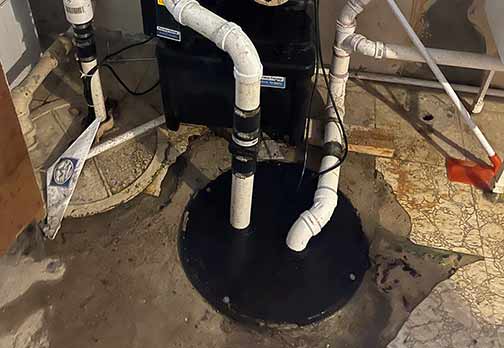
In the complex world of home maintenance, sump pumps emerge as unsung heroes. These devices are critical in safeguarding the foundational structure of homes, especially in regions susceptible to heavy rainfall or flooding. A sump pump is ingeniously designed to remove water that accumulates in a water-collecting sump basin, typically located in the basements of homes.
By efficiently directing water away from the foundation, sump pumps prevent water damage that can lead to costly repairs and compromise the structural integrity of a home.
Understanding the Mechanics of Sump Pumps: How They Work to Protect Your Home
Sump pumps operate on a straightforward yet highly effective mechanism. Installed in a pit, known as a sump basin, these pumps collect water from various sources such as rain, melting snow, or groundwater. When the water level in the basin rises to a predetermined point, the sump pump activates, pumping the water out of the basin and away from the house.
This process is crucial in preventing water from seeping into the basement, which can cause mold growth, foundation cracks, and other structural issues. The mechanics of sump pumps are designed to ensure that homes remain dry and structurally sound, even in the face of severe weather conditions.
Types of Sump Pumps: Choosing the Right One for Your Home’s Unique Needs
There are two main types of sump pumps: submersible and pedestal. Submersible sump pumps are installed underwater in the sump basin, making them quieter and more efficient for homes with larger basements. Pedestal sump pumps, on the other hand, have the motor mounted above the basin, making them easier to service and ideal for smaller basements.
When choosing a sump pump, homeowners should consider factors such as the size of their basement, the frequency of water accumulation, and their budget. Each type of sump pump offers distinct advantages, and selecting the right one ensures optimal performance and protection for your home.
The Multifaceted Benefits of Installing a Sump Pump in Your Home
Installing a sump pump offers numerous benefits that extend beyond mere water removal. First and foremost, it provides peace of mind by ensuring that a home is protected against water damage, which can be both financially and emotionally draining. Additionally, a sump pump helps maintain a dry and healthy basement environment, reducing the risk of mold and mildew growth. This is particularly important for families with members who have allergies or respiratory issues.
Furthermore, a well-maintained sump pump can increase the value of a home by enhancing its structural integrity and reducing the likelihood of future damage. By investing in a sump pump, homeowners can safeguard their property and enhance their quality of life.

Identifying Signs That Your Home Needs a Sump Pump: When to Take Action
Not all homes require a sump pump, but certain signs indicate the need for one. Frequent basement flooding, even during moderate rain, is a clear sign that a sump pump is necessary. Water stains on basement walls, musty odors, or visible mold growth are also indicators of moisture problems that a sump pump can address.
Additionally, homes located in low-lying areas or regions with high water tables are more susceptible to water issues and would benefit from the installation of a sump pump. Recognizing these signs early can prevent extensive damage and ensure that your home remains safe and secure.
Installation and Maintenance: Ensuring the Longevity and Efficiency of Your Sump Pump
Proper installation and maintenance are key to ensuring the longevity and efficiency of a sump pump. It is advisable to have the sump pump installed by a professional to ensure it is set up correctly and functions optimally. Regular maintenance, including cleaning the sump basin, checking the pump’s operation, and testing the backup power source, is essential to prevent malfunctions.
Homeowners should also consider investing in a battery backup system to ensure the sump pump operates during power outages, which often coincide with severe weather conditions. By prioritizing installation and maintenance, homeowners can maximize the lifespan and effectiveness of their sump pump systems.
Cost Considerations and Financial Benefits: Weighing the Investment in a Sump Pump
While the initial cost of purchasing and installing a sump pump can be a consideration for homeowners, the financial benefits far outweigh the expenses. The cost of repairing water damage and dealing with mold remediation can be exorbitant, making the investment in a sump pump a cost-effective solution.
Moreover, some insurance companies offer lower premiums or discounts for homes equipped with sump pumps, providing additional financial incentives for homeowners. By investing in a sump pump, homeowners can protect their properties and potentially reduce their insurance costs, making it a wise financial decision.
Environmental Impact: Sump Pumps and Sustainable Practices for a Greener Home
Sump pumps contribute to sustainable home practices by preventing water wastage and reducing the risk of water damage. By efficiently managing water accumulation, they help maintain the structural integrity of homes, reducing the need for resource-intensive repairs. Additionally, modern sump pumps are designed to be energy-efficient, minimizing their environmental footprint.
Homeowners can further enhance the sustainability of their sump pump systems by opting for models with energy-saving features and ensuring regular maintenance to keep them running efficiently. By choosing environmentally friendly sump pump options, homeowners can contribute to a more sustainable future.
To Sum It Up
In conclusion, sump pumps are indispensable tools for protecting homes against water damage and maintaining their structural integrity. By understanding the mechanics, types, and benefits of sump pumps, homeowners can make informed decisions about their installation and maintenance. While the initial investment may seem significant, the long-term benefits of having a sump pump far outweigh the costs, offering peace of mind and financial savings.
As part of a comprehensive home protection strategy, sump pumps play a crucial role in safeguarding what matters most: the safety and security of the home and its inhabitants. By investing in a sump pump, homeowners can ensure their homes remain dry and structurally sound for years to come.

